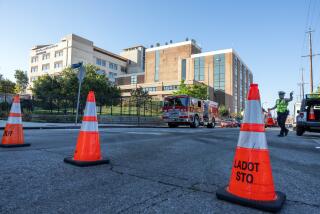King/Drew Ignored Surgical Safety Checks
- Share via
In hundreds of surgeries, operating room staff at Martin Luther King Jr./Drew Medical Center sewed up patients without checking whether instruments were left inside them, contrary to basic hospital safety standards.
The widespread failure, which was disclosed by Los Angeles County’s health director Wednesday, was uncovered by King/Drew officials after a metal clamp had been left inside a patient for 10 days last month.
The clamp error was the latest in a series of patient-care lapses identified in the last year at the county-owned hospital in Willowbrook, just south of Watts. It occurred six months after the health department brought in a crisis team and outside consultants to oversee changes at the hospital.
Dr. Thomas Garthwaite, director of the county Department of Health Services, said he could not explain why staff members had violated hospital policies and industry standards that call for them to count instruments before and after all surgeries.
“Somewhere along the line, we stopped doing instrument counts,” Garthwaite said. “This wasn’t just random.”
A hospital audit of several hundred cases from the last four to five months found no documentation that instruments had been counted, Garthwaite said. He said he did not know how far back the policy had gone unheeded.
But nurses and staff members consistently had been counting needles and sponges used during surgeries, he said.
Garthwaite said King/Drew staff were not aware of other cases in which instruments had been left inside patients.
The patient who had the clamp left inside him told The Times that when it was discovered, he feared for his life.
Jeffery Baber, a 42-year-old Compton mechanic, underwent emergency trauma surgery on June 22 for multiple gunshot wounds.
The 5-inch clamp, a scissors-like instrument used to cut off blood flow to certain areas, was discovered accidentally when Baber was being prepared for a separate surgery on his leg, officials said.
When the X-ray technician looked bewildered, Baber said, “I asked the guy, ‘What’s wrong, man?’, and he said there’s something shiny inside of me.
“They did another X-ray and another X-ray,” Baber said. “It showed plain as day, they had one of the clamps just sitting there. They had to go back in me.”
Though county officials said Baber was not injured, Baber blamed the clamp for intestinal cramps, severe back pain and a persistent fever during his first days in the hospital.
He said he was thankful that the error didn’t kill him.
“It could have been worse,” he said. “I could have been a lost cause.”
Leaving tools inside a surgical patient is rare, occurring in as few as one in 1,500 abdominal surgeries, studies show.
Baber, whose mother works at the hospital, said the surgeon who first operated on him, Dr. Anthony McCloud, told him that he had nothing to do with the mistake. McCloud also performed the operation to remove the clamp.
No one has apologized to him, Baber said.
Garthwaite said surgeons ultimately shoulder the blame for what goes on in their operating rooms.
“The attending surgeon is responsible for the conduct of the operation, in my mind,” he said.
“And the attending shouldn’t be delegating responsibilities to someone unless he feels they are able to handle them,” Garthwaite said.
McCloud declined to comment Wednesday through King/Drew Medical Director Roger Peeks. McCloud did not blame anyone else for the error, Peeks said.
Dr. Kenneth W. Kizer, president of the National Quality Forum, a patient safety group in Washington, D.C., said King/Drew may never know how many instruments were left in patients because surgical staff members weren’t following basic rules.
“It’s what you do when you’re taking care of patients the way you’re supposed to be taking care of them,” said Kizer, a former California health director. “And they’re not doing it. What can you say?”
County Supervisor Yvonne Brathwaite Burke, whose district includes King/Drew, said she called the hospital’s interim nursing director, Larry Kidd, on Wednesday for an explanation of the lapses.
He had “assumed all of the routine kind of things that were normally being done were being followed,” Burke said.
Kidd’s consulting firm, Camden Group, plans to bring in an operating room expert to go through every surgical policy and ensure that it was being followed, Burke said.
But she said she was still concerned over why the consultants, who were hired in December to address systemic concerns about King/Drew’s nursing care, didn’t find the problem sooner.
“You wonder,” she said, “you bring in the top consultants and experts, you think that all these things are going to be solved.”
She said that even she knows how important it is to count instruments.
“What I see on television, with very little experience in the operating room myself, there’s a routine counting of sponges and of instruments,” she said. “I’m very surprised that this is not followed there.”
More to Read
Sign up for Essential California
The most important California stories and recommendations in your inbox every morning.
You may occasionally receive promotional content from the Los Angeles Times.










